ket考试常见句型
KET写作常用词汇和句型
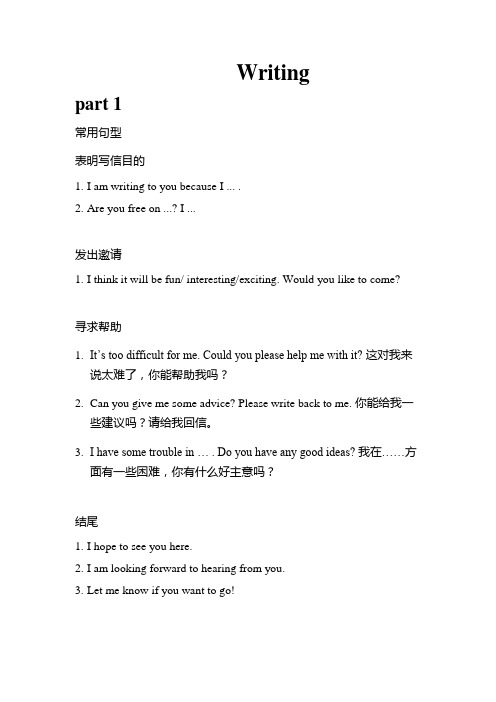
Writingpart 1常用句型表明写信目的1.I am writing to you because I ... .2.Are you free on ...? I ...发出邀请1.I think it will be fun/ interesting/exciting. Would you like to come?寻求帮助1.It’s too difficult for me. Could you please help me with it? 这对我来说太难了,你能帮助我吗?2.Can you give me some advice? Please write back to me. 你能给我一些建议吗?请给我回信。
3.I have some trouble in … . Do you have any good ideas? 我在……方面有一些困难,你有什么好主意吗?结尾1.I hope to see you here.2.I am looking forward to hearing from you.3.Let me know if you want to go!回信1.Thank you for your massage/letter/e-mail.感谢你的来信。
2.I am happy to hear from you. 非常开心收到你的来信。
3.Thank you for your invitation. I am really interested in… 感谢你的邀请,我对……确实很感兴趣。
4.Thank you for your invitation, but I am afraid that I couldn’t come.Because I am not free on that day. 感谢你的邀请,但是我恐怕不能去,因为我那天没空。
5.I am happy to hear the news that… 我很高兴听到这个消息。
ket口语必背句型

ket口语必背句型KET口语必背句型1. 问候与介绍:- Hello, my name is [name]. 你好,我叫[name]。
- Nice to meet you. 很高兴见到你。
- Where are you from? 你来自哪里?- I'm from [country/city]. 我来自[国家/城市]。
2. 询问情况:- How are you? 你好吗?- What's your favorite color/food/movie? 你最喜欢的颜色/食物/电影是什么?3. 提出建议:- You should [verb]. 你应该[动词]。
- Why don't you [verb]? 你为什么不[动词]?- Have you considered [verb-ing]? 你考虑过[动词-ing]吗?4. 请求与允许:- Can I [verb]? 我可以[动词]吗?- May I [verb]? 我可以[动词]吗?- Could you please [verb]? 你能[动词]吗?5. 提供帮助:- Do you need any help? 你需要帮助吗?- Can I help you with anything? 我可以帮你什么忙吗?- Let me know if you need any assistance. 如果你需要帮助,请告诉我。
6. 请求与提供信息:- Excuse me, where is the nearest restaurant? 打扰一下,最近的餐厅在哪里?- Do you know where I can find a bank? 你知道我可以找到银行吗?- I'm not sure, but I think it's [location]. 我不确定,但我认为它在[地点]。
7. 表达喜好与意见:- I love/hate [something]. 我喜欢/讨厌[某事]。
KET考试常见句型 pdf

thereis KET常用句型积累句型1:There+be +主语+地点状语/ 时间状语(某地点有某物。
)There is a boat in the river. 河里有条船.句型2:What’s wrong with+sb. / sth. ?(某物/某人有什么问题?)What’s wrong with your watch?你的手表有什么毛病?句型3:How do you like...?(你觉得某事物怎么样?)How do you like China?你觉得中国怎么样?句型4:What do you like about...?(你喜欢某事物的什么?)What do you like about the movie Avatar?你喜欢电影阿凡达的什么?句型5:had better(not)+动词原形(最好去做某事。
)You’d better ask that policeman over there. 你最好去问问那边的那个警察。
句型6:How+adj. / adv. +主语+谓语!(感叹句)What a/ an+adj. +n. +主语+谓语!(感叹句)How cold it is today !今天多冷啊!What a fine picture it is!多美的一幅图画呀!句型7:Thank+sb. +for(doing)sth. (感谢某人做某事。
)Thank you for coming to see me. 感谢你来看我。
句型8:So+be/ 情态动词/ 助动词+主语(某人也是。
)(倒装句)She is fourteen years old. So am I. 她十四岁了。
我也是。
He can speak French. So can we. 他会说法语。
我们也会。
My father plays tennis. So does my mother. 我爸爸打网球。
我妈妈也打。
ket写作技巧经典句型
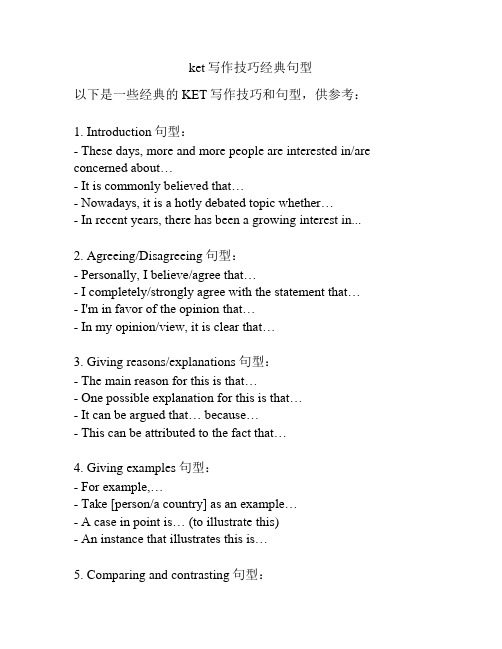
ket写作技巧经典句型以下是一些经典的KET写作技巧和句型,供参考:1. Introduction句型:- These days, more and more people are interested in/are concerned about…- It is commonly believed that…- Nowadays, it is a hotly debated topic whether…- In recent years, there has been a growing interest in...2. Agreeing/Disagreeing句型:- Personally, I believe/agree that…- I completely/strongly agree with the statement that…- I'm in favor of the opinion that…- In my opinion/view, it is clear that…3. Giving reasons/explanations句型:- The main reason for this is that…- One possible explanation for this is that…- It can be argued that… because…- This can be attributed to the fact that…4. Giving examples句型:- For example,…- Take [person/a country] as an example…- A case in point is… (to ill ustrate this)- An instance that illustrates this is…5. Comparing and contrasting句型:- On the one hand,…- On the other hand,…- In contrast to this,…- Similarly,…- Likewise,…- However,…- Nevertheless,…- Despite/In spite of this,…6. Expressing purpose句型:- The purpose of this essay/article is to…- The aim/objective of this piece of writing is to…7. Offering suggestions/recommendations句型:- One possible solution to this problem is to…- It might be a good idea to…- My suggestion/advice would be to…- To tackle/resolve this issue, it is recommended that…8. Concluding句型:- To sum up/conclude,…- In conclusion,…- All in all,…- Taking everything into account,…- Overall,…- Based on the above analysis, it can be concluded that…9. Expressing personal preference句型:- Personally, I prefer/like/enjoy…- My favorite/preferred option is…- If I had to choose, I would go with…10. Describing advantages/disadvantages句型:- One notable advantage/benefit of… is that…- The main drawback/downside of… is that…- Another negative aspect of… is that…这些句型和技巧可以帮助写作时更好地表达观点、支持论据、举例、比较等。
ket常用句型积累
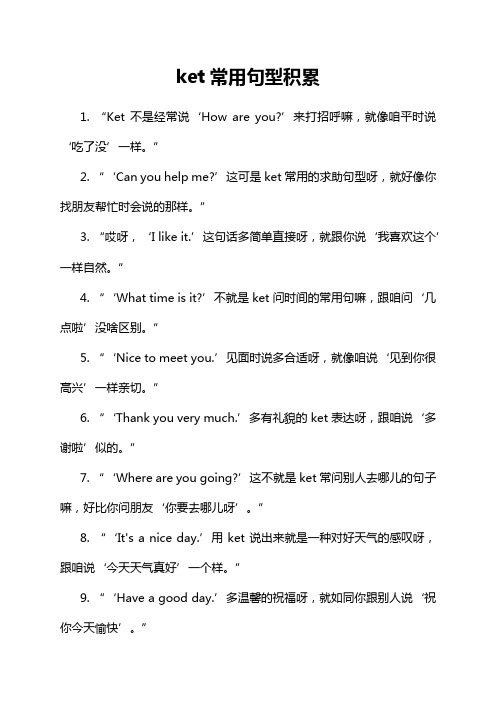
ket常用句型积累
1. “Ket 不是经常说‘How are you?’来打招呼嘛,就像咱平时说‘吃了没’一样。
”
2. “‘Can you help me?’这可是 ket 常用的求助句型呀,就好像你找朋友帮忙时会说的那样。
”
3. “哎呀,‘I like it.’这句话多简单直接呀,就跟你说‘我喜欢这个’一样自然。
”
4. “‘What time is it?’不就是 ket 问时间的常用句嘛,跟咱问‘几点啦’没啥区别。
”
5. “‘Nice to meet you.’见面时说多合适呀,就像咱说‘见到你很高兴’一样亲切。
”
6. “‘Thank you very much.’多有礼貌的 ket 表达呀,跟咱说‘多谢啦’似的。
”
7. “‘Where are you going?’这不就是 ket 常问别人去哪儿的句子嘛,好比你问朋友‘你要去哪儿呀’。
”
8. “‘It's a nice day.’用 ket 说出来就是一种对好天气的感叹呀,跟咱说‘今天天气真好’一个样。
”
9. “‘Have a good day.’多温馨的祝福呀,就如同你跟别人说‘祝你今天愉快’。
”
10. “‘I don't know.’这句话多实在呀,就像咱说‘我不知道’一样干脆。
”
我觉得积累这些ket 常用句型真的很有用呀,可以让我们更好地进行交流和表达呢。
ket需要掌握的句子
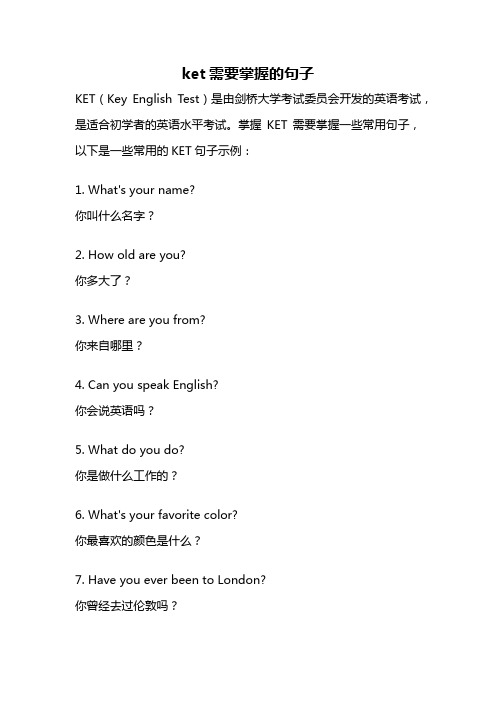
ket需要掌握的句子KET(Key English Test)是由剑桥大学考试委员会开发的英语考试,是适合初学者的英语水平考试。
掌握KET需要掌握一些常用句子,以下是一些常用的KET句子示例:1. What's your name?你叫什么名字?2. How old are you?你多大了?3. Where are you from?你来自哪里?4. Can you speak English?你会说英语吗?5. What do you do?你是做什么工作的?6. What's your favorite color?你最喜欢的颜色是什么?7. Have you ever been to London?你曾经去过伦敦吗?8. Can you help me, please?请你帮个忙,好吗?9. How was your weekend?你的周末过得怎么样?10. I like playing basketball.我喜欢打篮球。
11. My favorite food is pizza.我最喜欢的食物是比萨。
12. I have a pet cat.我养了一只猫。
13. I'm sorry, I don't understand.对不起,我不明白。
14. Could you repeat that, please?请你再重复一遍好吗?15. I'm going to the park this afternoon.今天下午我要去公园。
16. What time is it?现在几点钟了?17. I like watching movies.我喜欢看电影。
18. Can you recommend a good book?你能推荐一本好书吗?19. I'm sorry, I can't come to the party.对不起,我不能参加派对。
ket写作必会句型
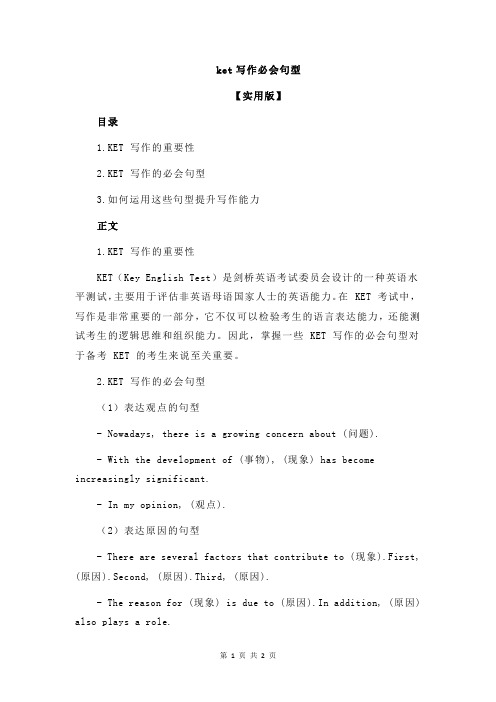
ket写作必会句型【实用版】目录1.KET 写作的重要性2.KET 写作的必会句型3.如何运用这些句型提升写作能力正文1.KET 写作的重要性KET(Key English Test)是剑桥英语考试委员会设计的一种英语水平测试,主要用于评估非英语母语国家人士的英语能力。
在 KET 考试中,写作是非常重要的一部分,它不仅可以检验考生的语言表达能力,还能测试考生的逻辑思维和组织能力。
因此,掌握一些 KET 写作的必会句型对于备考 KET 的考生来说至关重要。
2.KET 写作的必会句型(1)表达观点的句型- Nowadays, there is a growing concern about (问题).- With the development of (事物), (现象) has become increasingly significant.- In my opinion, (观点).(2)表达原因的句型- There are several factors that contribute to (现象).First, (原因).Second, (原因).Third, (原因).- The reason for (现象) is due to (原因).In addition, (原因) also plays a role.(3)表达对比的句型- In comparison with (事物), (事物) hasadvantages/disadvantages.- Although (事物) has its merits, it also has its drawbacks.(4)表达建议的句型- To address this problem, it is necessary for us to take (措施).- In conclusion, (现象) can be alleviated by implementing (措施).3.如何运用这些句型提升写作能力(1)多练习:在实际写作中运用这些句型,不断练习,使之成为自己的表达习惯。
ket必背短语
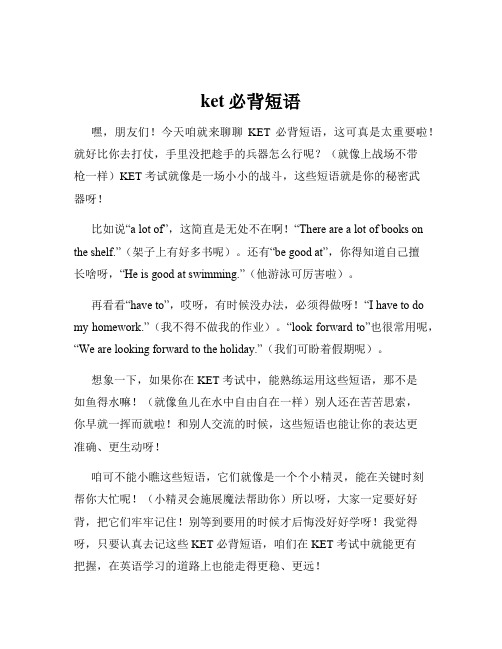
ket必背短语
嘿,朋友们!今天咱就来聊聊KET 必背短语,这可真是太重要啦!就好比你去打仗,手里没把趁手的兵器怎么行呢?(就像上战场不带
枪一样)KET 考试就像是一场小小的战斗,这些短语就是你的秘密武
器呀!
比如说“a lot of”,这简直是无处不在啊!“There are a lot of books on the shelf.”(架子上有好多书呢)。
还有“be good at”,你得知道自己擅
长啥呀,“He is good at swimming.”(他游泳可厉害啦)。
再看看“have to”,哎呀,有时候没办法,必须得做呀!“I have to do my homework.”(我不得不做我的作业)。
“look forward to”也很常用呢,“We are looking forward to the holiday.”(我们可盼着假期呢)。
想象一下,如果你在 KET 考试中,能熟练运用这些短语,那不是
如鱼得水嘛!(就像鱼儿在水中自由自在一样)别人还在苦苦思索,
你早就一挥而就啦!和别人交流的时候,这些短语也能让你的表达更
准确、更生动呀!
咱可不能小瞧这些短语,它们就像是一个个小精灵,能在关键时刻
帮你大忙呢!(小精灵会施展魔法帮助你)所以呀,大家一定要好好背,把它们牢牢记住!别等到要用的时候才后悔没好好学呀!我觉得呀,只要认真去记这些 KET 必背短语,咱们在 KET 考试中就能更有
把握,在英语学习的道路上也能走得更稳、更远!。
ket写作必背句型
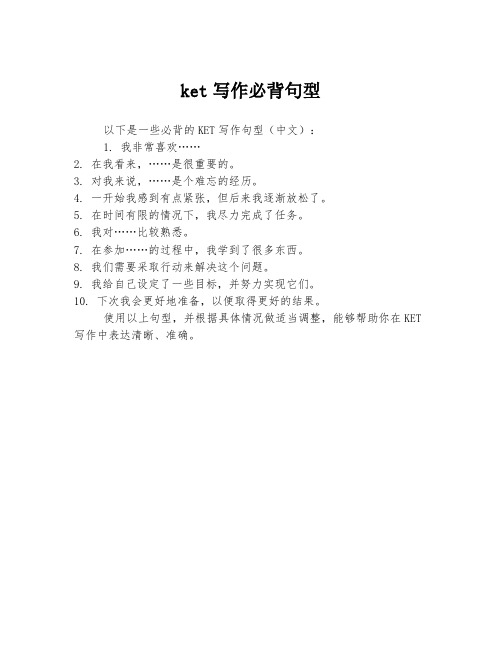
ket写作必背句型
以下是一些必背的KET写作句型(中文):
1. 我非常喜欢……
2. 在我看来,……是很重要的。
3. 对我来说,……是个难忘的经历。
4. 一开始我感到有点紧张,但后来我逐渐放松了。
5. 在时间有限的情况下,我尽力完成了任务。
6. 我对……比较熟悉。
7. 在参加……的过程中,我学到了很多东西。
8. 我们需要采取行动来解决这个问题。
9. 我给自己设定了一些目标,并努力实现它们。
10. 下次我会更好地准备,以便取得更好的结果。
使用以上句型,并根据具体情况做适当调整,能够帮助你在KET 写作中表达清晰、准确。
ket写作技巧经典句型
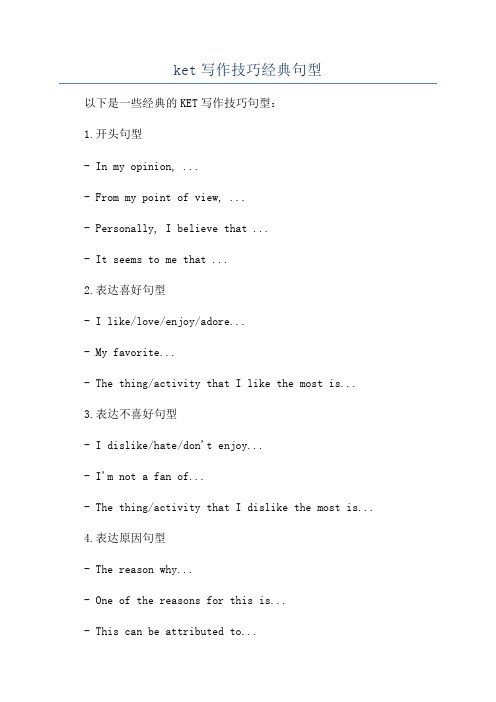
ket写作技巧经典句型以下是一些经典的KET写作技巧句型:1.开头句型- In my opinion, ...- From my point of view, ...- Personally, I believe that ...- It seems to me that ...2.表达喜好句型- I like/love/enjoy/adore...- My favorite...- The thing/activity that I like the most is... 3.表达不喜好句型- I dislike/hate/don't enjoy...- I'm not a fan of...- The thing/activity that I dislike the most is...4.表达原因句型- The reason why...- One of the reasons for this is...- This can be attributed to...5.表达喜欢与不喜欢的程度句型- I really like/love/enjoy...- I quite like/love/enjoy...- I don't mind...- I don't really like/enjoy...6.表达优缺点句型- One advantage/benefit of... is that...- The main advantage/benefit of... is...- However, one drawback/negative aspect of... is that... - The main disadvantage/negative aspect of... is...7.表达前后对比句型- On the one hand, ... On the other hand, ...- In contrast, ...- However, ...- Despite this, ...8.表达建议句型- It might be a good idea to...- I think it would be beneficial to...9.表达意见句型- Personally, I think...- In my opinion/view, ...- I believe that...- From my perspective, ...10.总结句型- To sum up,...- In conclusion,...- In summary,...- Overall,...这些句型可以帮助你组织你的KET写作,使你的语言更加流利和有条理。
英语KET口语训练
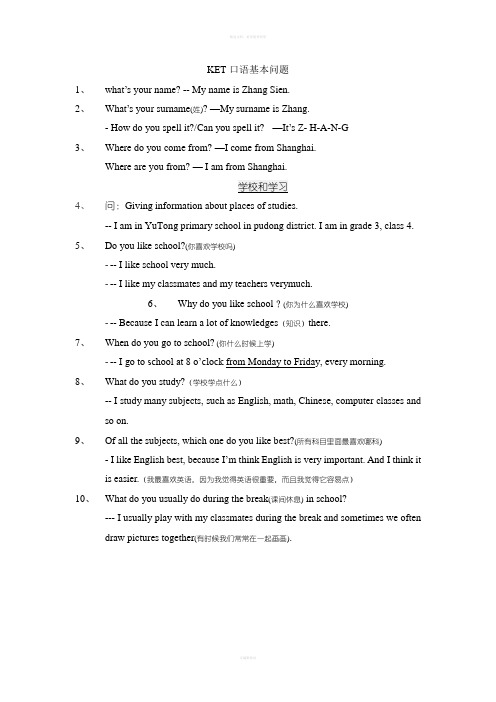
KET口语基本问题1、what’s your name? -- My name is Zhang Sien.2、What’s your surname(姓)? —My surname is Zhang.- How do you spell it?/Can you spell it? —It’s Z- H-A-N-G3、Where do you come from? —I come from Shanghai.Where are you from? — I am from Shanghai.4、问:Giving information about places of studies.-- I am in YuTong primary school in pudong district. I am in grade 3, class 4.5、Do you like school?(你喜欢学校吗)--- I like school very much.--- I like my classmates and my teachers verymuch.6、Why do you like school?(你为什么喜欢学校)--- Because I can learn a lot of knowledges(知识)there.7、When do you go to school? (你什么时候上学)8、What do you study?(学校学点什么)-- I study many subjects, such as English, math, Chinese, computer classes and so on.9、Of all the subjects, which one do you like best?(所有科目里面最喜欢哪科)- I like English best, because I’m think English is very important. And I think it is easier.(我最喜欢英语,因为我觉得英语很重要,而且我觉得它容易点)10、What do you usually do during the break(课间休息) in school?--- I usually play with my classmates during the break and sometimes we often draw pictures together(有时候我们常常在一起画画).11、What do you usually do after school?--- I usually do my homework(做作业)and sometimes I go shopping(购物) with my family.12、What are you going to do tomorrow/next weekend/next holiday?--- I am going to go swimming tomorrow/next weeken、d/nextholiday…because I like it very much.13、What do you want to be in the future? Why?- I want to be a doctor in the future. Because doctors can help sick people.14、What’s your favorite sport? When did you play it last time?(过去式,上次运动是什么时候)-- My favorite sport is swimming. Because it can make me relaxed(让我放松)and keep me healthy(让我保持健康).- And the last time I swam was last Sunday. (上次游泳是上周日)15、How often do you do that?(问频率,多久一次)--I usually go swimming once a week.(一周一次)16、what can you learn from your hobby?(从爱好中,学到了什么)--From going swimming, I know that practice is very important(练习很重要). And swimming makes me stronger.17、what do you do at weekends?(周末干什么)-- well,(想不起来的话可以用well、let me think缓冲,切忌支支吾吾),-- It all depends,(视情况而定),but I usually do my homework first and then go swimming.18、How much time do you spend on your hobby?(在爱好上花了多少时间)--I will spend two hours on my hobby every week. Because practice is very important. (练习很重要)19、Did you do any sport yesterday?(回答时注意用动词的过去式)-- no, I didn’t. Because I should do my homework first.(我必须先做作业)20、Where did you go last week?(上周去哪里啦)-- Last Sunday, I went to a park to junmp rope(去了公园跳绳). It was interesting.旅游21、Did you go on holiday last holiday?-- Yes, I did.22、Where did you go? And how did you go there?-- I went to suzhou. I went there by train.23、How long did it take? And what do you think of it?(你觉得怎么样)-- It took 3 days. I think Suzhou is a beautiful city.(我觉得苏州是个美丽的城市)24、Have you ever been to other countries?(去过别的国家吗)-- No, I hav en’t25、How many people are there in your family?-- There are four people in my family. They are my father,my father,my little sister(小妹) and me.26、what do your parents do? Where do they work?-- My father is a teacher, he works in a school. My mother is an engineer and she works in a big company.27、what’s your parents’ hobbies?-- My father likes making coffee(我爸爱做咖啡)and my mother likes planting flowers.(我妈喜欢种花)28、How many meals do you have everyday?(一天吃几顿饭)-- I have three meals everyday(每天). They are breakfast, lunch and dinner.29、What do you usually have for a meal?--I usually have an egg, milk and bread for breakfast. (早饭吃蛋、牛奶、面包)Some meat and vegetable and rice for lunch.(午饭吃肉、菜、饭)For dinner I will eat porridge and fruits.(晚饭吃粥和水果)30、Why do you like it?(为什么吃某个食物)-- Because i t’s goo d for my health.(因为它有益健康)31、How often do you eat it?(多久吃一次这个食物)-- I often eat it everyday(每天)/ once a week(一周一次).32、How often do you go out for dinner?(eat out 出去外面吃)--I often eat out once a week(一周一次).33、What kind of food do you think can be called healthy food?(什么食物是健康的)-- Such as vegetables and fruits(蔬菜和水果)can be called healthy food. Because i t’s goo d for my health.(因为它有益健康)34、What’s your favorite animals?(最喜欢什么动物)-- My favorite animal is panda. Because it’s very cute35、Where will you go to see animals?-- I usually see the animals in the zoo(在动物园见到).36、Where do you like shopping?(喜欢在哪里购物)--I like shopping in Wanda square(万达广场), because it’s near my home.(离我家近)37、Did you go shopping last weekend?-- No.I didn’t. Because I have no time.(因为我没时间)38、Do you like bargaining (讨价还价)when you go shopping?-- No, I don’t like it. Because I think it’s ashamed.(难为情的)39、Who do you usually go shopping with?(和谁一起去逛街)-- I usually go shopping with my mother(我经常去逛街和我妈一起).40、Do you like on-line shopping?(你喜欢网上买东西吗)--Yes, I like it. Because it’s cheaper(更便宜)and it’s convenient(方便)for us.打招呼进去的时候注意礼貌:May I come in?Good afternoon. -- Good afternoon.Nice to meet you. --Nice to meet you, too.Glad to meet you. -- Glad to meet you, too.Hello. -Hello听不清的时候说:Sorry, I beg your pardon?希望对方再说一遍问题:Would you please to say it again?How are you doing? /How are you?----I’m doing fine. / I’m fine.很好。
KET考试常见句型

KET常用句型积累(某地点有某物。
)句型1:There+be +主语+地点状语/ 时间状语时间状语 (某地点有某物。
)There is a boat in the river. 河里有条船. 某人有什么问题?)句型2:What’s wrong with+sb. / sth. ?(某物?(某物/某人有什么问题?)What’s wrong with your watch你的手表有什么毛病?你的手表有什么毛病??(你觉得某事物怎么样?)句型3:How do you like...?(你觉得某事物怎么样?)How do you like China?你觉得中国怎么样??你觉得中国怎么样??(你喜欢某事物的什么?)句型4:What do you like about...?(你喜欢某事物的什么?)What do you like about the movie Avatar?你喜欢电影阿凡达的什么??你喜欢电影阿凡达的什么?)+动词原形 (最好去做某事。
)(最好去做某事。
)句型5:had be er(not)+动词原形You’d be er ask that policeman over there. 你最好去问问那边的那个警察。
你最好去问问那边的那个警察。
+主语+谓语!(感叹句)句型6:How+adj. / adv. +主语+谓语!(感叹句)+主语+谓语!(感叹句)What a/ an+adj. +n. +主语+谓语!(感叹句)+主语+谓语!(感叹句)How cold it is today !今天多冷啊!!今天多冷啊!What a fine picture it is!多美的一幅图画呀!!多美的一幅图画呀!(感谢某人做某事。
)句型7:Thank+sb. +for(doing)sth. (感谢某人做某事。
)Thank you for coming to see me. 感谢你来看我。
感谢你来看我。
助动词+主语 (某人也是。
ket写作必会句型

ket写作必会句型1. It is widely believed that... (被广泛认为...)2. In recent years, there has been a growing concern over... (近年来,人们对...持有越来越大的关注)3. There is no denying the fact that... (毫无疑问...)4. It goes without saying that... (不言而喻...)5. It is worth noting that... (值得注意的是...)6. From my perspective,... (从我的角度来看...)7. It can be concluded from the above discussion that... (从上面的讨论可以得出结论...)8. There is a strong correlation between... and... (在...和...之间有着强烈的相关性)9. It is essential that we... (我们必须...)10. From what has been discussed above, we can draw the conclusion that... (总结以上讨论,我们可以得出结论...)11. It is of great significance that we... (我们...具有重要意义)12. It goes without saying that it is necessary for us to... (不言而喻,我们有必要...)13. It is universally acknowledged that... (被普遍认为...)14. It is no doubt that... (毫无疑问...)15. It is no surprise that... (毫不奇怪...)16. It is a common belief that... (一种普遍的观点是...)17. It is generally accepted that... (普遍认为...)18. It is true that... (的确是...)19. It is undeniable that... (不可否认的是...)20. It is crucial that we... (我们必须极其重要的是...)。
KET必会语法(一)
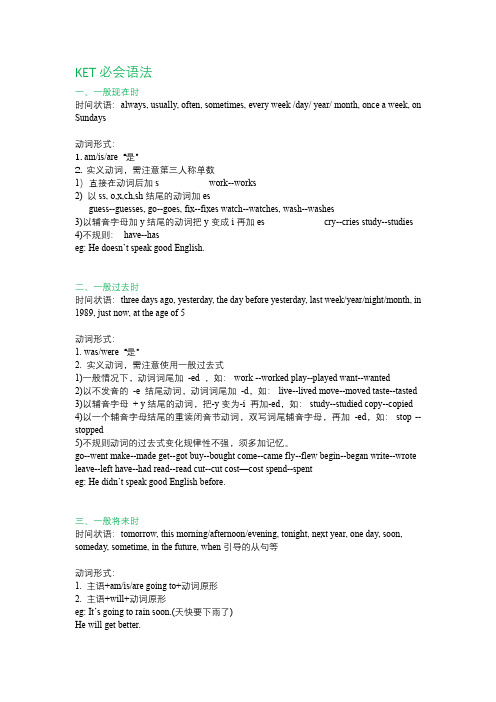
KET必会语法一、一般现在时时间状语:always, usually, often, sometimes, every week /day/ year/ month, once a week, on Sundays动词形式:1. am/is/are“是”2. 实义动词,需注意第三人称单数1)直接在动词后加s work--works2) 以ss, o,x,ch,sh结尾的动词加esguess--guesses, go--goes, fix--fixes watch--watches, wash--washes3)以辅音字母加y结尾的动词把y变成i再加es cry--cries study--studies4)不规则:have--haseg: He doesn’t speak good English.二、一般过去时时间状语:three days ago, yesterday, the day before yesterday, last week/year/night/month, in 1989, just now, at the age of 5动词形式:1. was/were “是”2. 实义动词,需注意使用一般过去式1)一般情况下,动词词尾加-ed ,如:work --worked play--played want--wanted2)以不发音的-e 结尾动词,动词词尾加-d,如:live--lived move--moved taste--tasted3)以辅音字母+ y结尾的动词,把-y变为-i 再加-ed,如:study--studied copy--copied4)以一个辅音字母结尾的重读闭音节动词,双写词尾辅音字母,再加-ed,如:stop --stopped5)不规则动词的过去式变化规律性不强,须多加记忆。
go--went make--made get--got buy--bought come--came fly--flew begin--began write--wrote leave--left have--had read--read cut--cut cost—cost spend--spenteg: He didn’t speak good English before.三、一般将来时时间状语:tomorrow, this morning/afternoon/evening, tonight, next year, one day, soon, someday, sometime, in the future, when引导的从句等动词形式:1. 主语+am/is/are going to+动词原形2. 主语+will+动词原形eg: It’s going to rain soon.(天快要下雨了)He will get better.四、现在进行时时间状语:now, at this time, these days, look. listen动词形式:主语+ am/ is /are +现在分词注意动词使用现在分词:1)一般情况下,动词词尾加-ing ,如:work --working play--playing2)以不发音的-e 结尾动词,去e再加-d,如:live--living3)以一个辅音字母结尾的重读闭音节动词,双写词尾辅音字母,再加-ing,如:run –runing swim--swimming4)不规则lie--lying(撒谎/平躺) die--dyingeg: What are you doing up in the tree? (你在树上干什么?)I am writing a long novel these days. (我最近在写一本长篇小说)五、现在完成时时间状语:yet, already, just, never, ever, so far, by now, since+时间点,for+时间段,recently, lately, in the past few years动词形式:主语+have/has +过去分词eg: He has been here since 5 years ago. 五个星期前他就在这里了。
ket语法知识:常见口语句型

ket语法知识点:口语常见句型常见短句:◆All I want is…我想要的是……。
◆All we can do is…我们所能做的就是……。
◆Do you by any chance know…? 你也许知道……吧?◆How do you like…? 你觉得……如何?◆I didn't realize…我没意识到……。
◆I find it hard to…我发现……很难。
◆I hate to say it, but…我真的不想这么说,但是……。
◆I really appreciate…我真的很感激……。
◆I was impressed by…我被……打动。
/ ……给我留下深刻印象。
◆I'll try my best to... 我会尽全力……。
◆I'm fed up with…我厌烦……。
/我受够了……。
◆I'm here to…我是来这里…….。
◆I'm thinking of…我打算……。
◆It is impossible to………不可能。
◆It might be a good idea to………也许是个好主意。
◆…is really something. ……真是太棒了。
◆It was kind of…有一点……。
◆Just tell me if…如果……,尽管告诉我。
◆…means a lot to me. ……对我来说很重要。
◆Why don't you…? 为何不……?实用例句:1. I am a student studying in Wuhan University, and I m ajor in Computer Science.我是武汉大学的学生,主修计算机科学2. I chose my major because I thought it was popular, s o it will be easier for me to find a job after graduation.我之所以选择这个专业,是因为我觉得它很受欢迎,毕业后我会更容易找到一份好工作。
剑桥KET简单句五种句型
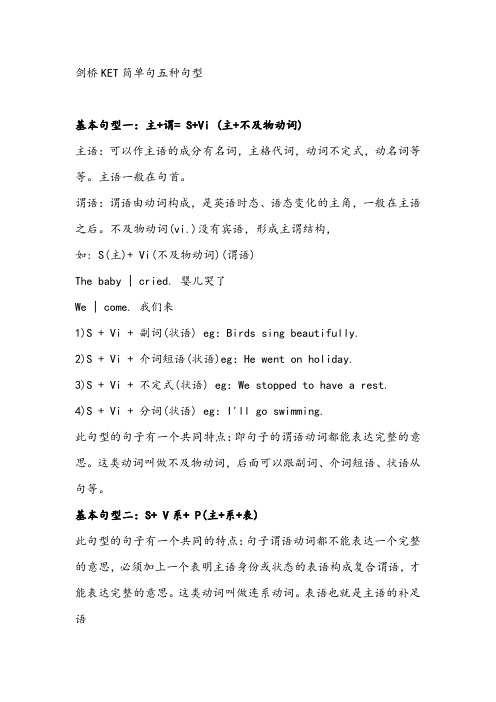
剑桥KET简单句五种句型基本句型一:主+谓=S+Vi(主+不及物动词)主语:可以作主语的成分有名词,主格代词,动词不定式,动名词等等。
主语一般在句首。
谓语:谓语由动词构成,是英语时态、语态变化的主角,一般在主语之后。
不及物动词(vi.)没有宾语,形成主谓结构,如:S(主)+Vi(不及物动词)(谓语)The baby|cried.婴儿哭了We|come.我们来1)S+Vi+副词(状语)eg:Birds sing beautifully.2)S+Vi+介词短语(状语)eg:He went on holiday.3)S+Vi+不定式(状语)eg:We stopped to have a rest.4)S+Vi+分词(状语)eg:I'll go swimming.此句型的句子有一个共同特点:即句子的谓语动词都能表达完整的意思。
这类动词叫做不及物动词,后面可以跟副词、介词短语、状语从句等。
基本句型二:S+V系+P(主+系+表)此句型的句子有一个共同的特点:句子谓语动词都不能表达一个完整的意思,必须加上一个表明主语身份或状态的表语构成复合谓语,才能表达完整的意思。
这类动词叫做连系动词。
表语也就是主语的补足语This│is│an English-Chinese dictionary.The dinner│smells│good.He│is growing│tall and strong.1)S+V+名词/代词eg:He is a boy.2)S+V+形容词eg:She is beautiful.3)S+V+副词eg:Class is over.4)S+V+介词短语eg:He is in good health.5)S+V+分词eg:He is excited.基本句型三:S+Vt+O(主+及物+宾)此句型句子的共同特点是:谓语动词都具有实义,都是主语产生的动作,但不能表达完整的意思,必须跟有一个宾语,动作的承受者,才能使意思完整。
ket写作技巧经典句型

ket写作技巧经典句型参考如下:1. 引出主题/开篇句型:- When it comes to...(当谈到...时)- Recently, there has been a heated debate/discussion about...(最近,围绕...展开了一场激烈的辩论/讨论)- It is widely acknowledged that...(众所周知...)- In today's society/world, it is no longer an uncommon occurrence for...(在当今社会/世界上,...已经不再是一种罕见事件)2. 表达观点/主题句型:- From my perspective/point of view, I firmly believe that...(从我的角度/观点来看,我坚信...)- It is beyond doubt that...(毫无疑问...)- There is no denying the fact that...(不可否认的事实是...)- It is universally acknowledged that...(普遍认为...)- I am of the opinion that...(我认为...)3. 举例/论证句型:- For instance, a recent survey conducted by... (例如,最近由...进行的一项调查)- A case in point is...(一个典型的例子是...)- Take...as an example(以...作为例子)- Research has shown that...(研究表明...)- It has been proven that...(已经证明...)4. 引用观点/引用别人的句型:- According to...(根据...)- As stated by...(正如...所说)- As mentioned in...(正如...所提到的)- In the words of...(用...的话来说)- This idea is supported by...(这个想法得到了...的支持)5. 分析利弊/优劣句型:- On the one hand, there are several advantages/benefits to...(一方面,...有几个优点/好处)- On the other hand, it cannot be denied that there are some drawbacks/negative impacts to...(另一方面,不可否认...存在一些缺点/负面影响)- Despite the disadvantages, the benefits of...outweigh the drawbacks(尽管存在缺点,但...的好处超过了缺点)- While there are some downsides to..., the advantages are more significant(虽然...有一些缺点,但好处更为显著)6. 总结/结论句型:- In conclusion, it can be said that...(总之,可以说...)- Taking all factors into consideration, it can be concluded that...(综上所述,可以得出结论...)- From what has been discussed above, we can draw the conclusion that...(从以上讨论中,我们可以得出结论...)- To sum up all of above, one can confidently say that...(总结以上所有内容,可以自信地说...)- Based on the analysis above, it is evident that...(基于以上分析,很显然...)。
- 1、下载文档前请自行甄别文档内容的完整性,平台不提供额外的编辑、内容补充、找答案等附加服务。
- 2、"仅部分预览"的文档,不可在线预览部分如存在完整性等问题,可反馈申请退款(可完整预览的文档不适用该条件!)。
- 3、如文档侵犯您的权益,请联系客服反馈,我们会尽快为您处理(人工客服工作时间:9:00-18:30)。
KET常用句型积累句型1: There+be +主语+地点状语/时间状语(某地点有菜扬。
)There i s a boat i n the r i ver・河里有条船.句型2: What' s wrong with + sb・/ sth.(某.物/某人有什么问题)What1 s wrong with your watch你的手表有什么毛病>句型3: How do you like...(你觉得某爭扬怎么样)How do you I ike China你觉得中国怎么样句型4: What do you I ike about..・(你喜欢某爭物的什么)What do you I ike about the movie Avatar你喜欢电影阿凡达的什么句型5: had better (not)+动词原形(最好去做某事。
)You' d better ask that pol iceman over there.你最好去问问那边的那个警察。
句型6: How+adj. / adv. +主语+谓语!(感叹句)What a/ an+adj. +n. +主语+谓语!(感叹句)How cold it i s today !今天多冷啊!What a fine picture it i s !多美的一幅图画呀!句型7: Thank+sb・+for (doing) sth.(感谢某人做某芋。
)Thank you for coming to see me.感谢你来看我°句型8: So+be/情态动词/助动词+主语(菜人也是。
)(倒装句)She is fourteen years old. So am I.她十四岁了。
我也是。
He can speak French. So can we.他会说法语。
我们也会。
My father plays tenni s. So does my mother.我爸爸打网球。
我妈妈也打。
句型9: •…not・・・until・・・(直到某时才做某事)He didn' t have supper unt i I his parents came back.直到他的父母回来他才吃饭。
句型10:比较级+ and +比较级(越来越……)The baby cr ied harder and harder・那孩子哭得越来越厉害。
句型门:the +比较级,the +比较级(越.......... ,越.... )The more one has, the more one wants. 越有越贪。
句型12:・・・as +ad j. / adv.+as・・・(某事物与另一爭物相比如何)•••not as (so) +adj・/ adv. +as・・・(某•事物不如另一事扬..... )Do you think that art is as important as music 你认为艺术和音乐一样重要吗Last Sunday the weather was not so wet as it is today.上个星期天的天气不如今天的天气潮遼。
句型13: more/ less +adj. +than...(某事物与另一事物相比更............. /某事物不如另一事物……)I think art i s less important than music・我认为艺术不如音乐重要。
句型14: stop-^from doing sth.The Great Green V/aI I wi I I stop the wind from blowing the earth away.绿邑长城舟阻挡风吹走土壤。
The medicine wi I I stop the virus from damaging the immune system. 这种药能阻止病毒破坏免疫系统。
句型15: both •…and・・・(两者都 ....... )Both you and I are students.我和你都是学生o句型16: either… or...(或者 ......... ,或者...... )Either you or he is wrong・不是你错就是他错。
!句型17: neither・・・nor・・・(既不 .... ,也不...... )Neither he nor I am a student.我和他都不是学生。
句型18:・・・as soon as・・・(一 .... 就.... )As soon as I see him, I’ I I give him the message・我一见到他,我就把你的消息告诉他。
句型19:・・・so + adj・/ adv. +that・・・(太 ..... 以至于 .... )I was so t i red that I didn' t want to speak.我累得连话也不想说了。
句型20: Though... 4-主句(虽然……,但……)Though I I ike writing to my pen-friend, it takes a lot of time.虽热我喜欢给笔友写信,但它要耗娈我大量时间。
句型21: be going to (将要做菜事)This afternoon I' m going to buy a KET practice set.今天下午我要去买一套KET 练习题。
句型22: be different from (与...... 不同)I think this is different from Chinese names.我认为这与汉语名字不同。
句型23: We I come(back) t。
… (欢迎来到/回到……)We I come back to school !欢迎回到学校!句型24: have fun doing (做某事非常开心)We' re going to have fun learning Engl i sh this term.这学期我们将兴味盎然地学习英语。
句型25:・・・because・・・(由于……,所以……)I don' t know al I your names because this is our f i rst lesson・因为这是我们的第一节课,所以我并不知道你们所有人的名字。
句型26: Why don' t sb. do sth. / Why not do sth.(为什么不.......... )Why don' t you come to school a little ear I ier 为什么不早点到校呢Why not have a party by the pool为什么不在泳池边开派对呢<句型27: make it (定下,决定)Let * s make it half past nine.让我们定在九点半吧!句型28: have nothing to do (无所事爭)They have nothing to do every day.他们毎天无所事事<>句型29: be sure/ be sure of/ about sth. / be sure to do sth.(关于某事很确定/很确定会做某事)I am pretty sure to go this way.我很确定要走这条路。
I was not sure of / about the r ight way to open the box, so I asked someone else・我不太确定打开盒子的正确方式,所以我问了别人。
句型30: between •…and・・・(在 ....... 与 ... 之间)There is a shop between the hospital and the school・在那家医院和那所学校之间有一家商店。
句型31: keep sb. / sth. +adj. / V-ing/介词补语/ adv.(使英人或某事物保持.............. )You must keep your classroom clean.你们必须保持教室干净。
Sorry to have kept you waiting・对不起,让你久等。
Can you keep him in the room你能让他在这个房里吗Keep them here.让他们在这儿呆着。
句型32: find +宾语+宾补(某人发现某事,宾语从句)He finds it very hard to travel around the big city・他发现要环游这个大城市是很难的。
句型33:・・・not・・・anymore/ longer (再也不 ...... /不再 .... )The old man doesn' t travel any more.这位老人不再旅行了。
He isn* t a thief any longer・他不再是个贼.<>句型34: What f s the weather like...(某地的天气如何)What' s the weather I ike i n spr ing i n your hometow n 在你们家乡春天天气怎么样句型35: There is no time to do/ sb. have/has no time to do (没时间做某事/某人没时间做某事)There v/as no time to think.没有吋间思考。
I have no time to go home for lunch.我没有时间回家吃午饭。
句型36: used to do (过去常常做某事)I used to read this kind of story books.我过去常读这种故事书。
